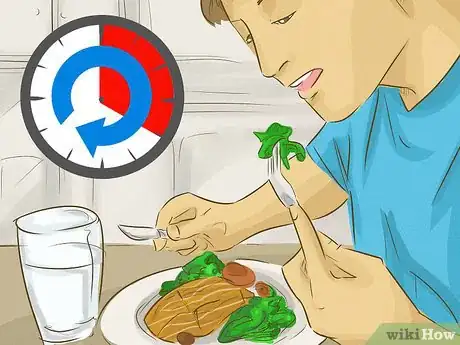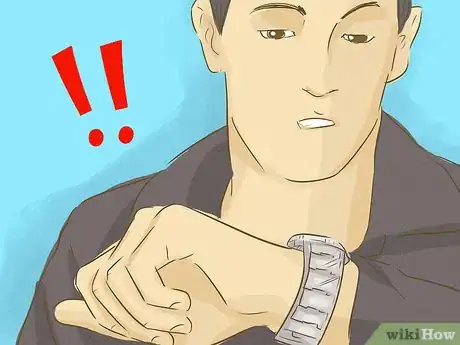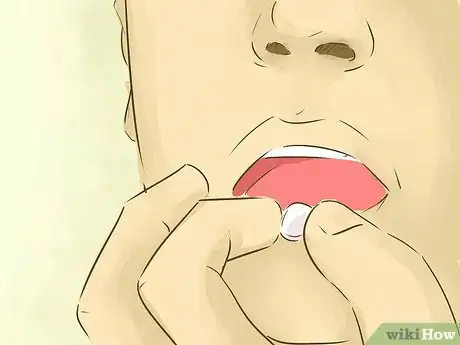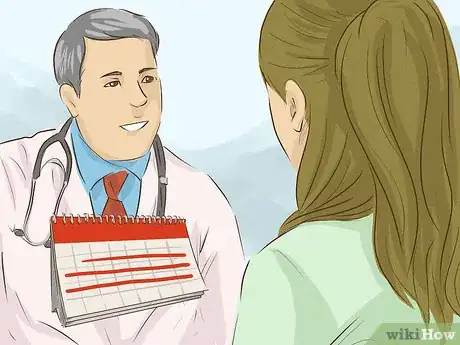This article was co-authored by Luba Lee, FNP-BC, MS. Luba Lee, FNP-BC is a Board-Certified Family Nurse Practitioner (FNP) and educator in Tennessee with over a decade of clinical experience. Luba has certifications in Pediatric Advanced Life Support (PALS), Emergency Medicine, Advanced Cardiac Life Support (ACLS), Team Building, and Critical Care Nursing. She received her Master of Science in Nursing (MSN) from the University of Tennessee in 2006.
This article has been viewed 41,226 times.
Cipro is an antibiotic prescribed for a variety of bacterial infections. Cipro helps clear up bacterial infections by stopping the bacteria from growing. Your doctor might want you to take it in pill or liquid form. In either case, make sure you’re following your doctor’s instructions for when and how often you should take it. Cipro can become less effective when combined with certain drugs and food. Make sure you ask your pharmacist if there are certain foods you should avoid.
Steps
Timing Your Cipro Correctly
-
1Take it at the same time every day. Cipro is most effective when you have a consistent amount in your body. This means you should try to take it at the same time every day, with doses evenly spaced out.[1]
- For example, if you’re supposed to take it once a day, take it every day at the same exact time. If you’re supposed to take it twice a day, take it every 12 hours.
- It can be helpful to set a timer so you remember to take it. You can use an alarm on your smartphone or a regular alarm clock.
-
2Take Cipro with or without food. Cipro can be taken after a large meal or on an empty stomach. However, there are a few exceptions:[2]
- Calcium-rich foods, such as yogurt, dairy, and fortified orange juice. Calcium makes Cipro less effective. To avoid this, wait 6 hours after your last calcium-rich meal to take Cipro, or take it 2 hours before your next meal.
- Meals that are high in iron, zinc, and magnesium. Wait 6 hours to take Cipro if you've eaten a meal that's high in these minerals, or take it 2 hours before your next meal.
- These exceptions don't apply if you're eating a particularly large meal. In that case, you can take Cipro at any time.
Advertisement -
3Take a missed dose as soon as you remember. If you missed your dose and it's almost time for your next one, just wait for your next dose. If you do miss a dose, don’t double up on your next one to make up for it. Take a single dose.[3]
Taking Your Daily Doses
-
1Follow your doctor’s dosage directions. How much, how often, and for how long you take Cipro will vary, depending on why you’re taking it. Your doctor should give you full dosage and usage instructions. Make sure you follow them exactly.[4]
-
2Swallow the tablet whole. If you’re prescribed an extended-release tablet, make sure you swallow it whole. You shouldn't smash, crush, or chew it when you take it.[5]
-
3Take the tablet with a full glass of water. You don’t need to eat when you take Cipro, but you should swallow it with a full glass of water. Drink about half the glass of water, take the pill, and then drink the rest of the water.[6]
-
4Shake the liquid medication for 15 seconds. The liquid medication will have microcapsules in it that look like bubbles or small beads. Shake the medicine to evenly disperse them throughout the liquid. Don't chew the microcapsules before you swallow the medicine.[7]
-
5Measure out your liquid dose with the included measuring cup. If you’re prescribed liquid Cipro, your medication will come with a measuring cup. Use that cup to measure out your dose, and not a regular teaspoon or tablespoon. This helps ensure you get exactly the right amount of medicine.[8]
-
6Take your entire prescription. You may start feeling better before you’ve finished your Cipro prescription. Don’t stop taking it, even if you feel better. You’ll need to take the entire prescription to ensure the infection doesn’t come back.[9]
Avoiding Interactions
-
1Don’t take Cipro with dairy products. Any dairy products, including milk and yogurt, can react with the Cipro and make it less effective. Don't consume any dairy products 2 hours before or after you take your dose.[10]
- If you do eat dairy products, wait 6 hours to take Cipro or take it 2 hours before your next meal.
- If you're eating dairy products with a large meal, it's OK to take your Cipro.
-
2Avoid taking Cipro within 2 hours of taking antacids, vitamins, or supplements. If you need to take an antacid, vitamin, or supplement, take it 6 hours before you take Cipro or 2 hours after.
- Talk to your doctor if you're not sure how to take Cipro with antacids, vitamins, or supplements.
-
3Don’t drink more than 2 caffeinated drinks a day. Cipro can make the effects of caffeine last longer. You can have coffee, tea, or soda while you’re on Cipro, but don’t have more than 2 of those drinks per day. You should also avoid taking your Cipro with those types of drinks. It’s better to take it with clear water.
Expert Q&A
-
QuestionCan I take Cipro while taking an antidepressant?
 Luba Lee, FNP-BC, MSLuba Lee, FNP-BC is a Board-Certified Family Nurse Practitioner (FNP) and educator in Tennessee with over a decade of clinical experience. Luba has certifications in Pediatric Advanced Life Support (PALS), Emergency Medicine, Advanced Cardiac Life Support (ACLS), Team Building, and Critical Care Nursing. She received her Master of Science in Nursing (MSN) from the University of Tennessee in 2006.
Luba Lee, FNP-BC, MSLuba Lee, FNP-BC is a Board-Certified Family Nurse Practitioner (FNP) and educator in Tennessee with over a decade of clinical experience. Luba has certifications in Pediatric Advanced Life Support (PALS), Emergency Medicine, Advanced Cardiac Life Support (ACLS), Team Building, and Critical Care Nursing. She received her Master of Science in Nursing (MSN) from the University of Tennessee in 2006.
Board-Certified Family Nurse Practitioner In most cases, it is safe to take Cipro and antidepressants. In my own practice, I have never avoided using Cipro in someone who is on antidepressants, especially for short-term use such as to clear out a bladder infection. However, there is a warning that using ciprofloxacin together with some SSRIs such as sertraline (Zoloft) can increase the risk of an irregular heart rhythm, which may increase the risk of adverse health effects. While an adverse interaction between Cipro and antidepressant is possible, it is a relatively rare side effect.
In most cases, it is safe to take Cipro and antidepressants. In my own practice, I have never avoided using Cipro in someone who is on antidepressants, especially for short-term use such as to clear out a bladder infection. However, there is a warning that using ciprofloxacin together with some SSRIs such as sertraline (Zoloft) can increase the risk of an irregular heart rhythm, which may increase the risk of adverse health effects. While an adverse interaction between Cipro and antidepressant is possible, it is a relatively rare side effect.
Warnings
- Talk to your obstetrician before taking Cipro if you’re breastfeeding. Your doctor can tell you if it’s safe to continue breastfeeding while you’re taking it.⧼thumbs_response⧽
- If you experience rash or hives, swelling in your face, throat, or lips, shortness of breath, seizures, or severe diarrhea, see your doctor. They can be symptoms of a negative reaction.⧼thumbs_response⧽
- You might get dizzy or lightheaded after taking Cipro. Don’t drive or operate machinery until you’ve had a few doses so you know how it will affect you.⧼thumbs_response⧽
References
- ↑ https://www.drugs.com/ciprofloxacin.html
- ↑ https://www.urmc.rochester.edu/medialibraries/urmcmedia/medicine/general-medicine/patientcare/documents/ciprofloxacin_brochure_urmc.pdf
- ↑ http://www.netdoctor.co.uk/medicines/infections/a28037/ciprofloxacin-dosage-and-how-to-take/
- ↑ https://www.nhs.uk/medicines/ciprofloxacin/
- ↑ https://patient.info/medicine/ciprofloxacin-for-infection-ciproxin
- ↑ https://patient.info/medicine/ciprofloxacin-for-infection-ciproxin
- ↑ https://www.drugs.com/ciprofloxacin.html
- ↑ http://www.netdoctor.co.uk/medicines/infections/a28037/ciprofloxacin-dosage-and-how-to-take/
- ↑ https://www.urmc.rochester.edu/medialibraries/urmcmedia/medicine/general-medicine/patientcare/documents/ciprofloxacin_brochure_urmc.pdf



-Step-3-Version-3.webp)






























































Medical Disclaimer
The content of this article is not intended to be a substitute for professional medical advice, examination, diagnosis, or treatment. You should always contact your doctor or other qualified healthcare professional before starting, changing, or stopping any kind of health treatment.
Read More...